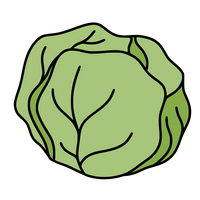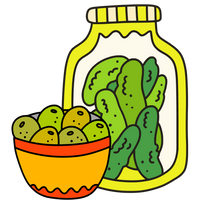
Feeling foggy, moody, or overwhelmed? Your gut might be trying to send you a message.
Life can be really hard. There are the constant to-do lists, notifications pushing from multiple devices, and frankly too many people demanding your time and energy. No wonder there’s anxious thoughts doing laps around your mind like it’s rush hour in there!
We’re not going to claim to have the answers, but we do have some food for thought (pun intended – gotta lighten the mood).
At Olive My Pickle, we’re all about sharing how probiotic fermented foods can support a healthier gut and a stronger, more resilient mind. Your gut and brain are deeply connected, communicating constantly through what’s called the gut-brain axis.
Exactly what is the gut brain-axis? In this article, we’ll explain the connection between the gut-brain axis and mental health, how nurturing your microbiome can improve your mental health, and how fermented foods can give you a natural mood boost.

Your Gut-Brain Axis: The Ultimate Text Thread
You know that one friend you text all day long - the one who just gets you? That’s exactly how your gut and brain communicate. They're in constant conversation, sharing updates, mood checks, and status reports 24/7. This chat is called the gut-brain axis, and it’s one of the most important lines of communication in your body.
And yes, it’s a real thing. Science is catching on to just how powerful the connection between your gut and mental health is for your overall mood. So if your gut’s feeling off, chances are your brain might be feeling it too.
The Two-Way Street That Links Digestion to Emotion
Let’s break it down like this:
The vagus nerve is the phone line - your body's longest nerve - and it’s the main connection between your gut and your brain. When your gut has something to say, it calls up the brain through this direct line.
And your gut? Oh, it’s chatty. It communicates using neurotransmitters, which are little chemical messengers. You’ve probably heard of the ones responsible for mood and emotion.
That would be those feel-good chemicals, serotonin and dopamine. About 95% of your body’s serotonin (the mood booster) and more than 50% of dopamine (think pleasure and satisfaction) are produced in the gut[1 , 2].

A happy gut sends steady “you got this” signals to your brain all day. But when things are off - maybe from stress, processed food, or not enough sleep - the messages change. The phone line gets glitchy, and your brain doesn’t get the calm, steady signals it needs.
That could look like:
- Anxiety
- Brain fog
- Low mood or depression
- Trouble sleeping
- Mood swings
The gut-brain axis is where digestion meets emotion, having a significant impact on mental health.
Still wondering if your gut might be connected to mood? Check out our article, Is Gut Health Connected to Your Happiness.
Your Gut Was Here First - Way Before the Brain
Time for a quick throwback. Before we had playlists, group chats, or even brains… we had guts.
Scientists have discovered that single-celled organisms (bacteria and archaea) showed up on Earth a long, long time ago. Not sure what those are? Think of them as tiny, microscopic life forms made up of just one cell. Unlike us (who are made of trillions of cells working together), these little guys did everything on their own: eat, move, react, survive. Solo-style.
Here’s the cool part: These early organisms had gut-like systems before anything that looked like a brain existed. So yes, the gut came first, and it handled all the decision-making - talk about early mental health support!
Fast forward to today, and we still carry that ancient wisdom in our bellies. Scientists now call the gut the “second brain” thanks to the enteric nervous system - a network of over 100 million nerve cells in your gut that communicates directly with your brain. It manages digestion, mood, and more - all on its own.
This direct connection through the gut-brain axis shows that your gut isn’t just supporting your digestion - it’s influencing your mental health from the inside out.

Mood, Anxiety, and Depression: The Gut Connection
Ever had one of those days where you just don’t feel like yourself - but you can't quite put your finger on why? Maybe your mood’s low, you're feeling anxious, or you're just... off. The connection between your gut health and mood might have something to do with it.
Your Microbiome Might Need some Probiotic Love
When your gut bacteria get out of balance, it can mess with your brain chemistry.
The vagus nerve is a key player here. Your gut microbes use it to send tiny messages - signals that influence how you feel, respond to stress, and even make decisions. That’s the gut-brain axis in action.
But when your gut is inflamed or unbalanced, those messages can get scrambled or completely dropped. That means your mental health might take a hit, and your mood can go from sunny to stormy real fast.
Here’s some research to back that up:
- A study from 2015 showed that fermented foods (high in probiotics) can alter how the human brain responds to negative social stimuli [3]. In other words, a gut with more diverse good bacteria could calm anxiety.
- This research from 2017 references a 30-day study where they compared giving probiotics vs. antidepressants and how probiotics had similar effects as anti-anxiety medication [4].
- This study from 2021 looks at how the gut regulates neurotransmitters and how there is growing evidence that gut health plays a role in neurological diseases like Alzheimer’s [2].
- While research is still in the early stages, scientists are exploring how gut health might impact symptoms of autism - particularly challenges with mood regulation and social connection [6].
Leaky Gut: The Weak Link in Mental Health
When your gut lining isn’t acting as a strong barrier, it can let inflammatory substances leak into your bloodstream. The term Leaky Gut is basically inflammation, and it's been linked to anxiety, depression, and other mental health concerns.
Other sneaky culprits that throw your gut and mental health off track:
- Stress: Raises cortisol, which slows down your good gut bacteria. Cue bloating, anxiety, and low mood.
- Sugar: Feeds the “bad” bacteria and leads to mood swings and cravings.
- Antibiotics: They can wipe out the good guys, too. Not good for your gut or your mental health.
The good news? You can support your gut (and mental health) with fermented foods that are rich in probiotics. A 2022 study in Nature Communications found that people who ate more fermented foods had better gut diversity and lower stress levels [5].
Basically, happy belly = brighter mood.
For more info on how to support your microbiome, read through our 9 Everyday Habits for Better Gut Health.

Feed Your Brain by Feeding Your Gut
You’ve probably heard the saying, “you are what you eat.” But when it comes to gut health, there’s a little more to it: you also feel how you eat. Thanks to the gut-brain axis, what’s happening in your gut directly influences your mood, mental clarity, and emotional resilience.
Real Food vs. Pills: Why Fermented Foods are Nature’s Multivitamin
There’s a lot of talk out there about probiotic supplements, but here’s the deal: when it comes to really nourishing your gut (and your brain), real, living foods win every time.
Fermented foods are packed with probiotics, digestive enzymes, and B vitamins that your gut and brain actually know how to use. They don’t just boost your gut health, they help support steady mood, sharper focus, and better overall mental health.
Foods like sauerkraut, kimchi, pickles, and olives aren’t just tasty add-ons to your plate – they’re powerful tools for feeling your best. Think of ferments as nature’s multivitamin: a dynamic, living mix of nutrients and good bacteria working together to help you thrive.
Need inspiration? Check out our blog, Creative Ways to Eat Fermented Foods with Every Meal.

Easy Ways to Work Fermented Foods into Your Routine
Supporting your gut-brain axis doesn’t have to be complicated. In fact, it can be the easiest thing you do for your mental health all week. Here’s a few simple ideas to get you started:
- Swap chips for Spicy Kosher Dill Fermented Pickles
- Add Carrot & Dill Fermented Sauerkraut to your wrap or sandwich.
- Snack on our Live-Culture Olives (they’re addicting and some of our customers eat an entire bag in one sitting!)
- Start your morning with a refreshing shot of LiveBrine Probiotic Pickle Juice.
- Add our Probiotic Hot Sauce to tacos, burgers, eggs, bowls… or really just about anything!
These little shifts feed your gut microbiome and strengthen the gut-brain connection, helping you feel like the calmer, cooler, cucumber version of yourself.
Peace, Pickles, and Mental Wellness
Whew, thanks for sticking with us to the end! We covered a lot, and you’ve got this!!
Caring for your gut is one of the most powerful steps you can take for better mental health. Even small shifts – like adding a forkful of sauerkraut to your lunch or swapping processed snacks for fermented veggies – can make a difference over time.
Your gut and brain are in constant conversation. By nourishing your gut with real, living foods, you’re giving your mind the support it needs to feel its best.
In the mood to stock up on ferments? Choose from our popular bundles or customize your own box today!
References
- Appleton, Jeremy. “The Gut-Brain Axis: Influence of Microbiota on Mood and Mental Health.” Integrative medicine (Encinitas, Calif.) vol. 17,4 (2018): 28-32. https://pmc.ncbi.nlm.nih.gov/articles/PMC6469458/
- Chen, Y., Xu, J., & Chen, Y. (2021). Regulation of Neurotransmitters by the Gut Microbiota and Effects on Cognition in Neurological Disorders. Nutrients, 13(6), 2099. https://doi.org/10.3390/nu13062099
- Matthew R. Hilimire, Jordan E. DeVylder, Catherine A. Forestell,Fermented foods, neuroticism, and social anxiety: An interaction model,Psychiatry Research,Volume 228, Issue 2,2015,Pages 203-208,ISSN 0165-1781, https://doi.org/10.1016/j.psychres.2015.04.023
- Clapp, M., Aurora, N., Herrera, L., Bhatia, M., Wilen, E., & Wakefield, S. (2017). Gut microbiota's effect on mental health: The gut-brain axis. Clinics and practice, 7(4), 987. https://doi.org/10.4081/cp.2017.987
- Berding, K., Bastiaanssen, T.F.S., Moloney, G.M. et al. Feed your microbes to deal with stress: a psychobiotic diet impacts microbial stability and perceived stress in a healthy adult population. Mol Psychiatry 28, 601–610 (2023). https://doi.org/10.1038/s41380-022-01817-y
- Taniya, M. A., Chung, H. J., Al Mamun, A., Alam, S., Aziz, M. A., Emon, N. U., Islam, M. M., Hong, S. S., Podder, B. R., Ara Mimi, A., Aktar Suchi, S., & Xiao, J. (2022). Role of Gut Microbiome in Autism Spectrum Disorder and Its Therapeutic Regulation. Frontiers in cellular and infection microbiology, 12, 915701. https://doi.org/10.3389/fcimb.2022.915701
- Harvard Health Publishing. Harvard Medical School. (2023). The Gut-Brain Connection. https://www.health.harvard.edu/diseases-and-conditions/the-gut-brain-connection
DISCLAIMER: THIS WEBSITE DOES NOT PROVIDE MEDICAL ADVICE
The content on this website is for informational or educational purposes only and does not substitute professional medical advice or consultations with healthcare professionals. Always seek the advice of your physician or other qualified healthcare provider(s) with any questions you have regarding a medical condition or treatment and before undertaking a new health care regimen.









